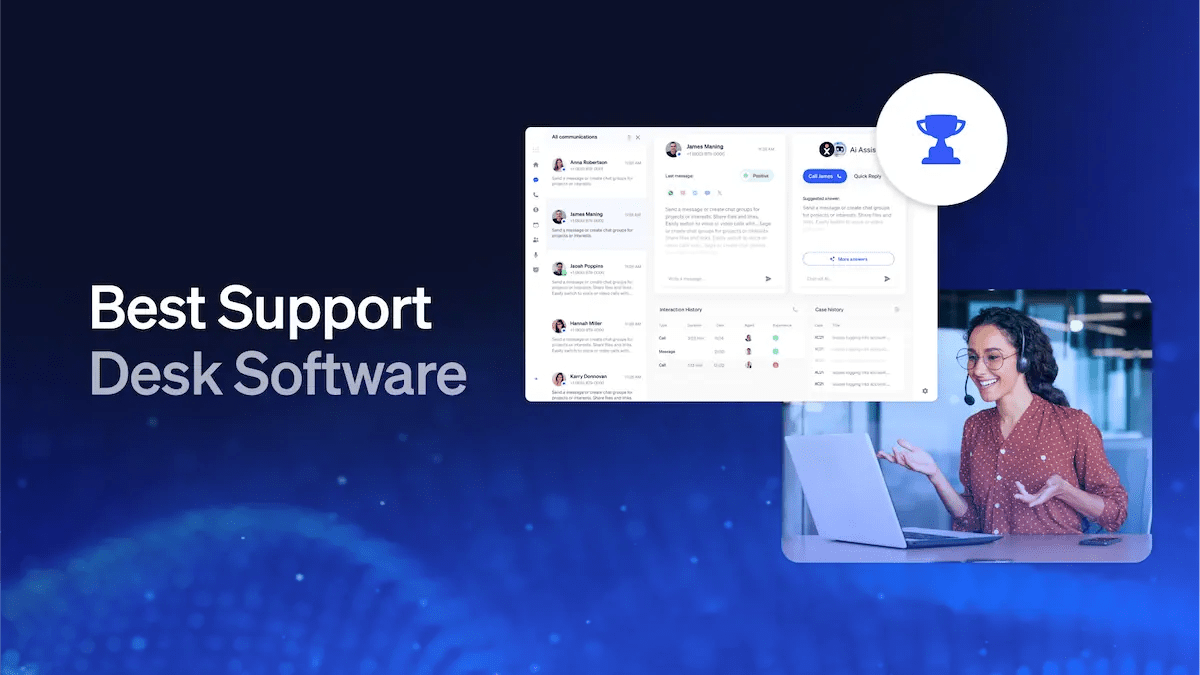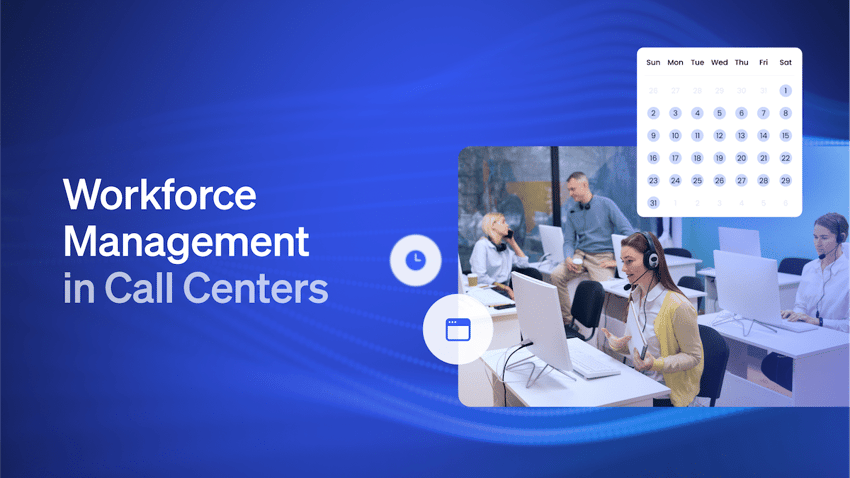What Is a Support Desk Software?
Support desk software is a platform that centralizes customer communication. Instead of managing requests through scattered email threads or spreadsheets, it unifies emails, calls, chats, and social messages into a single dashboard.
For growing businesses, investing in the right platform isn’t just about organization; it’s about efficiency. It allows your team to track, prioritize, and resolve customer issues faster, ensuring no request falls through the cracks.
Finding the right platform can be challenging given the number of options on the market. Below, we review the top 10 support desk platforms to help you choose the right fit for your business needs.
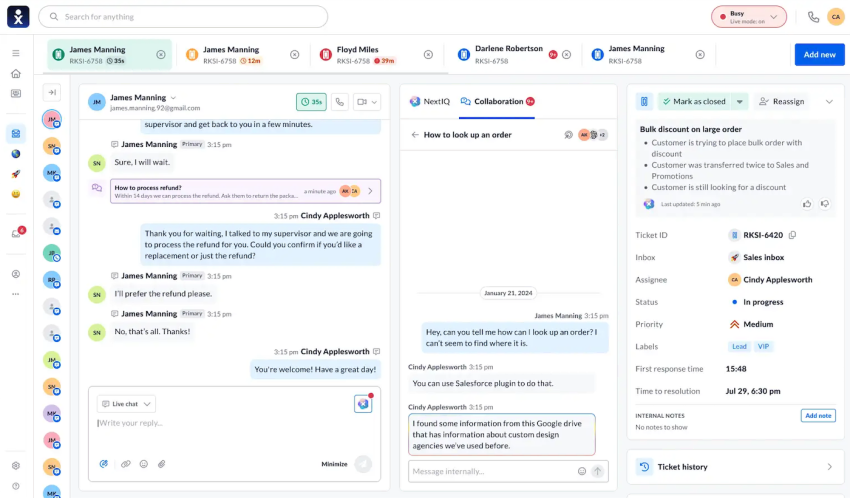
Top 10 Support Desk Platforms at a Glance
| Software | Best for | Starting price | Free trial |
|---|---|---|---|
| Nextiva | Unified Communications | $15/user/mo | Contact sales |
| Freshdesk | SMB Scalability | Free tier; $15/mo | 14 days |
| Zendesk | Enterprise Support | $19/user/mo | 14 days |
| ServiceNow | IT Service Mgmt (ITSM) | Contact sales | Varied |
| Help Scout | Shared Inbox Simplicity | $25/user/mo | 15 days |
| Zoho Desk | Budget Conscious | Free; $7/mo | 15 days |
| HubSpot | CRM Integration | Free; $9/seat/mo | 14 days (Professional suite) |
| Intercom | Chat & Automation | $29/user/mo | 14 days |
| Gorgias | E-commerce (Shopify) | $10/mo | 7 days |
| LiveAgent | All-in-one Value | $15/user/mo | 30 days |
The 10 Best Support Desk Software Platforms
Here’s a closer look at the top support desk providers you can choose from.
1. Nextiva – Best for Unified Communications
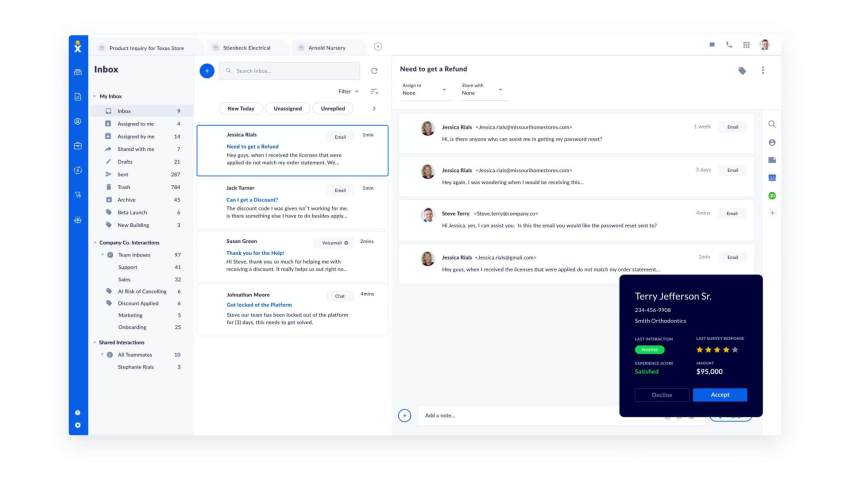
Nextiva distinguishes itself by combining business telephony with digital support tools. While most support desks handle tickets well, they lack integrated voice capabilities. Nextiva bridges this gap, offering a single platform for calls, video, chat, and ticketing.
- Why it works: You don’t need a separate phone vendor. When a customer calls, their history and details populate instantly on the agent’s screen.
- Key feature: Call Pop. Real-time customer intelligence displays the caller’s history and sentiment before the agent answers.
- Pricing: Starts at $15/user/mo.
2. Freshdesk – Best Value for SMBs

Freshdesk is an excellent choice for growing teams that need structure without a complex setup process. It offers a balance of ease of use and powerful features, making it a popular choice for small to mid-sized businesses.
- Why it works: It is intuitive and quick to deploy. Teams can often set up their help desk in a single afternoon.
- Key feature: Gamification. Features that turn ticket resolution into a competitive and motivating activity for agents.
- Pricing: Robust free plan available; paid plans start at $15/user/mo.
3. Zendesk – Best for Enterprise Scale
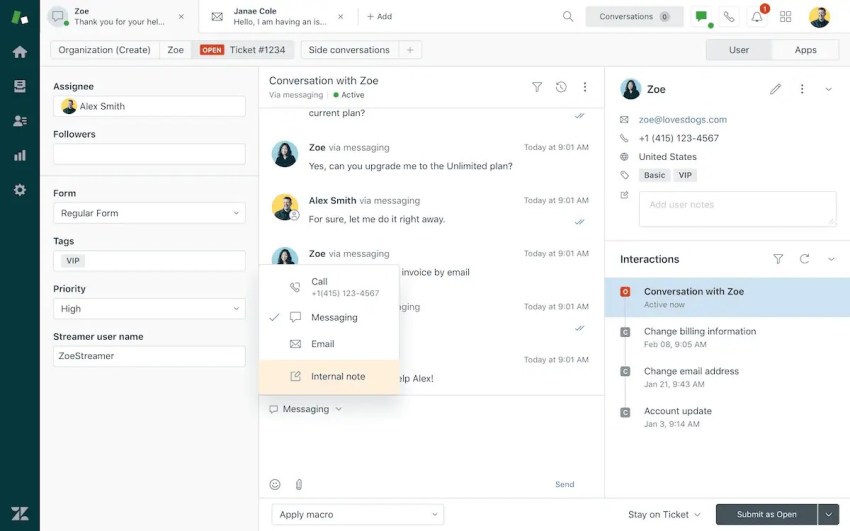
Zendesk is a market leader known for its flexibility and power. It is well-suited for large organizations with complex routing needs and hundreds of agents.
- Why it works: It’s highly customizable and integrates with almost any other business tool. If you have a complex workflow, Zendesk can likely accommodate it.
- Key feature: Agent Workspace. A unified interface that manages chat, email, voice, and social messaging in one view.
- Pricing: Starts at $19/user/mo.
4. ServiceNow – Best for IT Support (ITSM)

ServiceNow is the standard for large-scale IT departments. Unlike customer-facing tools, it focuses on internal employee support, IT asset management, and complex workflows.
- Why it works: It automates intricate IT processes, such as employee onboarding or hardware provisioning.
- Key feature: Self-Service Portals. Allows employees to resolve common IT issues, like password resets, without contacting support.
- Pricing: Custom quotes for enterprise clients only.
5. Help Scout – Best for a Human Touch
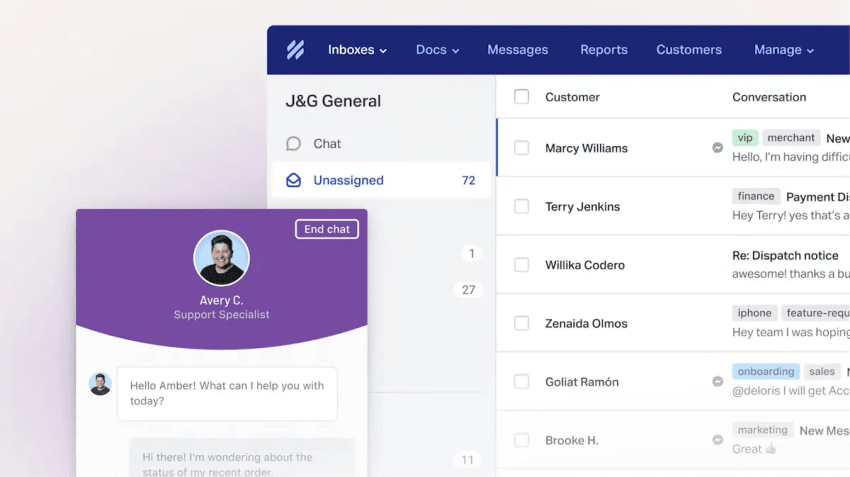
Help Scout is designed to look and feel like a standard email to the customer, avoiding the auto-responses that can feel impersonal. It is ideal for brands that prioritize high-touch relationships.
- Why it works: The Shared Inbox interface remains simple to use while offering powerful collaboration tools in the background.
- Key feature: Collision Detection. Alerts agents if someone else is already replying to a ticket to prevent duplicate efforts.
- Pricing: Starts at $25/user/mo.
6. Zoho Desk – Best Free Plan
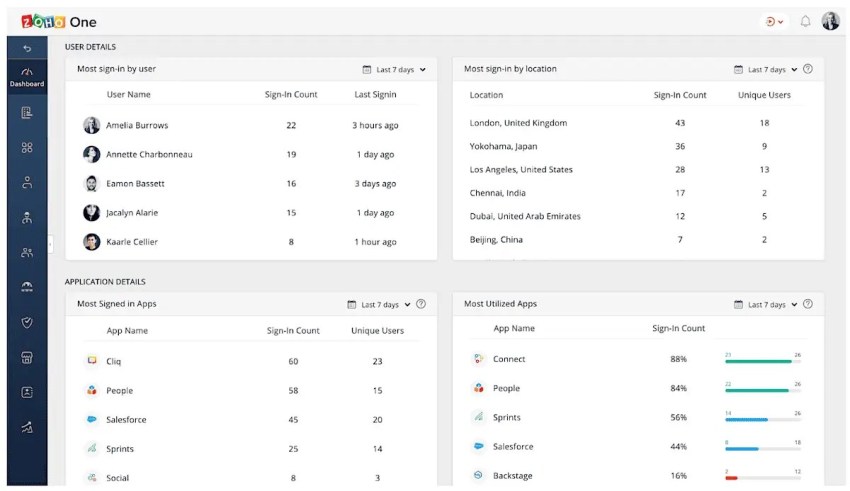
Part of the extensive Zoho ecosystem, Zoho Desk is a feature-rich option that is also budget-friendly. It’s a strong contender for startups already using other Zoho products.
- Why it works: The free plan is generous, including up to three agents and multi-channel support capability.
- Key feature: Zia (AI Assistant). An AI tool that analyzes ticket sentiment and suggests answers from your knowledge base.
- Pricing: Free plan available; paid plans start at $7/user/mo.
7. HubSpot Service Hub – Best for CRM Integration
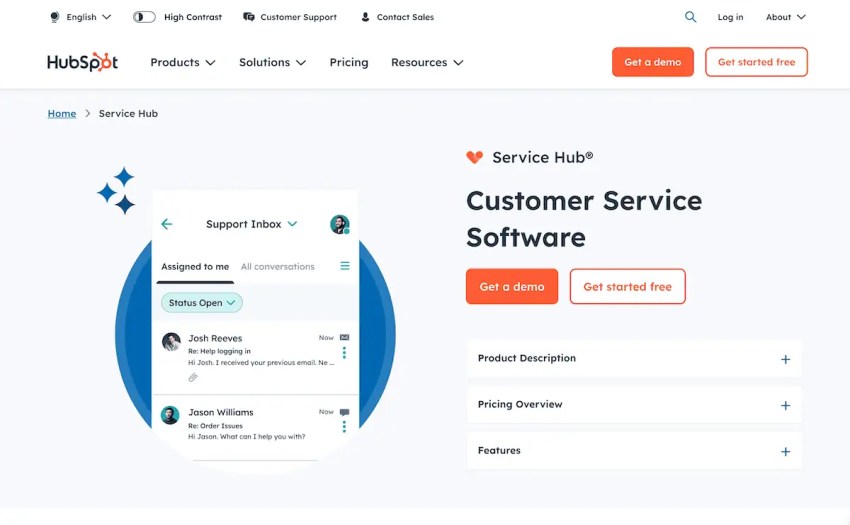
For teams that already use HubSpot for sales or marketing, Service Hub is the logical addition. It ensures all customer data lives in a single source of truth.
- Why it works: Support agents have full visibility into the customer’s journey, including marketing emails opened and sales interactions.
- Key feature: Customer Portal. A secure space where customers can log in to check the status of their tickets.
- Pricing: Free tools available; Service Hub starts at $9/mo for small teams.
8. Intercom – Best for Automation & Chat
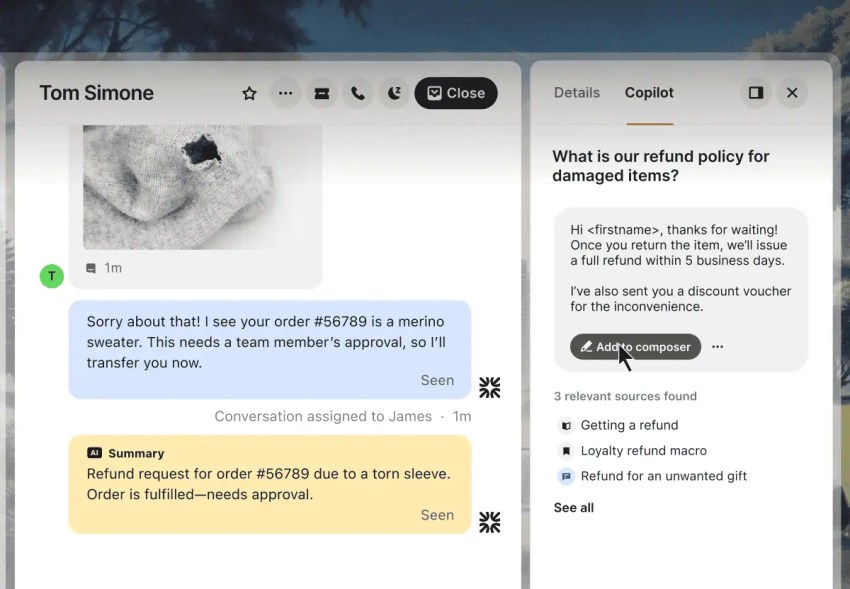
Intercom began as a chat widget and has evolved into a comprehensive support suite. It excels at conversational support and proactive messaging.
- Why it works: It allows you to message customers while they are using your product, often resolving issues before a ticket is even created.
- Key feature: Fin AI Agent. An AI bot capable of resolving complex queries rather than just serving FAQs.
- Pricing: Starts at $29/seat/mo.
9. Gorgias – Best for E-commerce
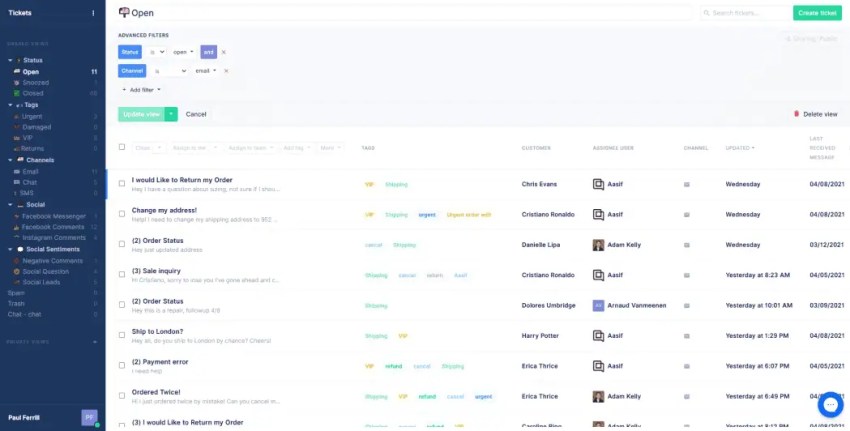
Gorgias is built specifically for online stores, offering deep integrations with platforms like Shopify, Magento, and BigCommerce.
- Why it works: Agents can see order data directly in the support window. They can refund orders or edit shipping details without switching tabs.
- Key feature: Sidebar Order Management. Perform order actions like refunds or cancellations instantly.
- Pricing: Starts at $10/mo (pricing is based on ticket volume).
10. LiveAgent – Best All-in-One Value
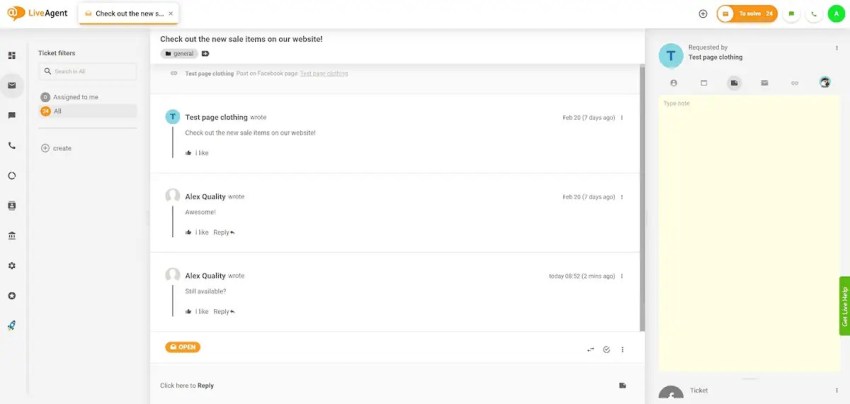
LiveAgent offers a versatile suite of help desk tools — including live chat, ticketing, and a built-in call center — at a very competitive price point.
- Why it works: It is known for speed and offers one of the fastest chat widgets on the market.
- Key feature: Universal Inbox. Consolidates emails, chats, Facebook messages, and tweets into a single stream.
- Pricing: Starts at $15/agent/mo.
Key Features to Look For in Support Desk Software
A support desk platform provides everything you need to centralize customer interactions and efficiently respond to requests and inquiries.
1. Ticketing system
Support desk software manages inbound customer inquiries through an automated ticketing system. This reduces wait times and ensures that no inquiry is overlooked. It also helps your support team efficiently manage its workload.
When a support request comes in through any of your communication channels, a ticket is automatically created in the help desk system. The ticket captures details such as the customer’s contact information, the nature of the issue, and any previous interactions.
The ticket is then assigned a unique identifier and routed to the appropriate support agent or team based on predefined rules or manual assignment. Support agents can update the ticket with notes, status changes, and resolutions as they work on the issue.
When an agent resolves the issue and closes the ticket, the support desk emails the customer. Depending on the settings, your ticketing system might also share a follow-up survey to collect feedback on the experience and gauge customer satisfaction.
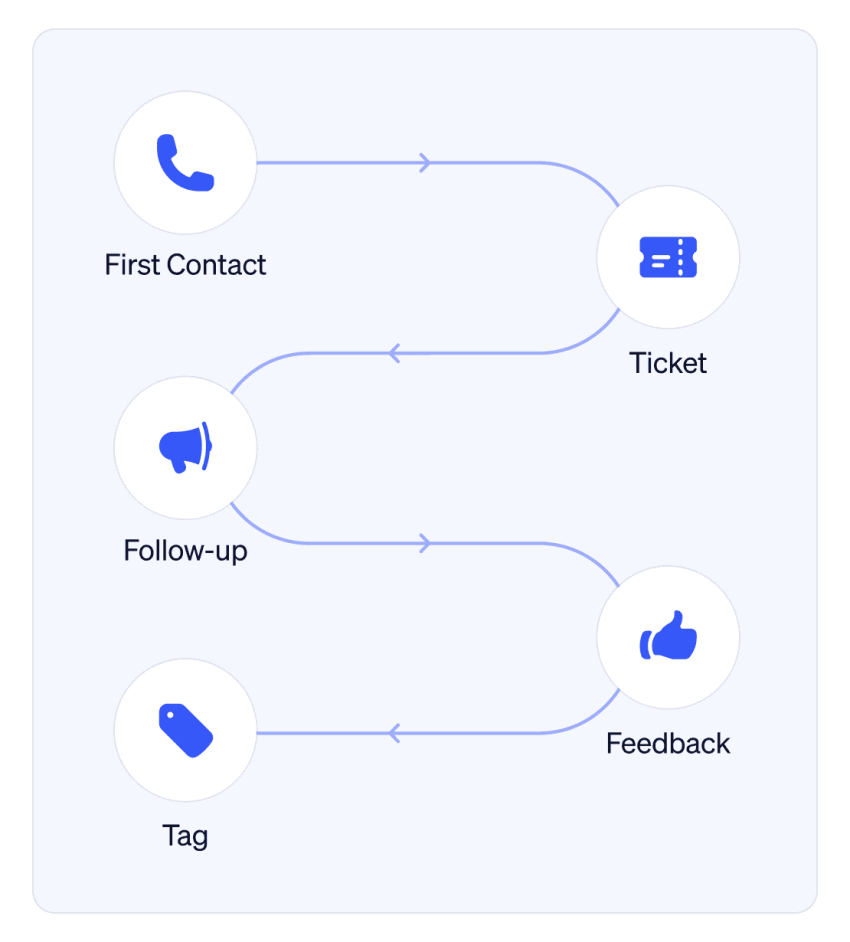
2. Automation
A support desk system automates repetitive tasks, giving your agents time to focus on meaningful customer interactions.
Take help desk ticketing, for example. Without it, you have to sort through customer inquiries manually, assign each query to the right agent, and follow up with agents in person to ensure they resolve the issue promptly. This process is very exhausting, error-prone, and inefficient.
Other help desk automation features include:
- Prewritten or canned responses: When a ticket includes a frequently asked question, the help desk software can automatically offer the appropriate canned reply, reducing response times.
- Service level agreement (SLA) management: Customer service automation prioritizes and escalates tickets based on your SLA policies. For instance, if a high-priority ticket is not addressed within a specific time frame, the help desk can automatically reassign it to a higher support level.

3. Knowledge base
Nearly 70% of customers try to resolve their issues independently before contacting your support team. Consider using your help desk software to create a searchable knowledge base to address this need. You can publish help articles, troubleshooting videos, and walk-through tutorials to provide ongoing customer support asynchronously.
Having a knowledge base also helps your agents, too. They’ll get fewer inbound requests, reducing their workload and improving team efficiency.
4. Omnichannel support
Support desk software is plugged with omnichannel support capabilities and helps support teams centrally manage customer conversations via email, phone, chat, social media, SMS, and other business communication channels. Agents maintain a unified dashboard and keep track of every request. Unified communications via support desk software simplifies workflows and ensures consistent, more personalized customer communication.
As your business grows, you can also add new channels like WhatsApp or in-app messaging to the same platform without fundamentally changing your support workflows.

5. Integrations
Most support desk platforms integrate well with popular CRM systems, project management apps, or e-commerce software. Business integrations give agents quick access to purchase history, shipping status, or previous support notes while responding to customer inquiries.
If a customer asks about a recent order, the agent doesn’t need to switch screens. They can check the Shopify or HubSpot data directly in the help desk and provide a complete answer immediately.
6. Reporting and analytics
Support desk tools feature reporting dashboards that showcase team performance. Managers can track response times, resolution rates, workloads, and customer satisfaction without having to trawl through spreadsheets. This makes it easier to see what’s working and where the process is slowing down.
The insights go beyond team performance. Analytics highlight common customer issues to resolve before they lead to bigger complaints. They also aid planning, for example, knowing when to add additional staff during peak times.
Most platforms track key customer service metrics like first response time, average resolution time, customer satisfaction scores (CSAT), ticket backlog, and agent utilization. Using this data, agents can plan, identify recurring issues, and develop better long-term support strategies.
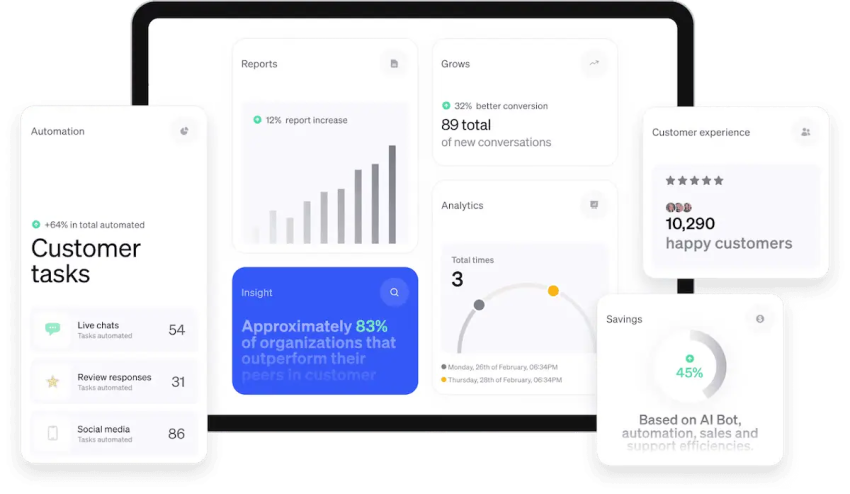
Benefits of a Support Desk Platform for Customer Service
The right support desk platform makes it easier for your customer teams to deliver excellent customer experiences at scale.
Improves the customer experience
A support desk platform streamlines all your communication channels into a single platform, allowing your support team to quickly monitor and respond to customer inquiries. Help desk tools equipped with AI also automate time-consuming tasks that your agents would have been occupied with — freeing them up for more meaningful and personalized customer interactions. This leads to better customer experiences and improved satisfaction.
Boosts team collaboration
A support desk provides a centralized platform where all team members can access the same information. This ensures everyone is on the same page and has the latest updates on customer issues.
Many support desk platforms also come with built-in collaboration tools such as shared inboxes, live chat, discussion boards, and document sharing, which help team members exchange ideas and ask for help efficiently.
Supports data-driven decision-making
Support desk software tracks and records insights based on day-to-day agent-customer interactions. You can track the total number of daily inquiries, average agent response time, peak periods, and so much more.
These insights will help you improve your support experience. Suppose you discover that a particular channel receives many customer service requests. In that case, you can assign more agents to it to monitor and respond to inquiries faster.
How To Choose The Right Support Desk Software Vendor
There are several things to consider when evaluating the best support desk software platforms.
1. Features and functionalities
Ensure that the support desk software offers the unique features you need to run a smooth customer service operation. For example, if you want to streamline all your communication channels into a single platform, you need help desk software with omnichannel support. On the other hand, if you’re going to improve how your support team members collaborate and share information, opt for a support desk with a shared inbox.
It’s also crucial for the software to sync with third-party applications like your CRM tool. That way, agents can access real-time information to personalize customer interactions.
2. Scalability
Choose service desk software that can scale up or down according to your changing business needs. During peak seasons, the software should efficiently manage high ticket volumes and calls without compromising response times or service quality. On the flip side, when demand decreases, you should be able to reduce the number of active agent seats to save on costs.
To assess scalability, examine the pricing plans offered. Flexible pricing plans and short-term contracts are good indicators that the software can adapt to rapid changes in your business and support workflow.
3. Pricing
Ensure that the support desk’s pricing plans offer the best value for your budget. If you’re a small team with a limited budget, choose affordable or free help desk software to reduce expenses while meeting your basic customer support needs, such as omnichannel interactions, ticket automation, and self-service.
For larger teams, look for advanced help desk solutions with extensive capabilities to support your complex workflow. For example, you’ll need a platform with workforce engagement features to help you monitor and optimize agent productivity at scale.
Better still, go for a support desk vendor like Nextiva that offers flexible plans for businesses of all sizes. Our Core plan, which starts at only $15 per user per month, is perfect for small teams. As your business scales, you can upgrade to our Engage or Power Suite CX plan for more advanced, AI-powered features.
4. Ease of use
Make sure your support desk software is easy to deploy and use. It shouldn’t have a significant learning curve or require extensive technical know-how to understand how it works. The best support desk software typically has a quick onboarding process, ensuring that your support desk is up and running as quickly as possible.
Why Nextiva Is a Strong Choice
Many support platforms require you to integrate a separate third-party phone system. Nextiva provides both in one solution.
- For small businesses: You get a professional business phone number and a help desk for one low monthly rate.
- For scaling teams: As you grow, you can upgrade to Power Suite CX to access AI-powered transcriptions, workforce management, and advanced analytics.
By consolidating your communication tools, you reduce complexity and cost.
Ready to simplify your support? Check out Nextiva’s pricing plans.

Check out Nextiva’s customer experience solutions to level up your support experience.
Personalized CX.
Support Desk Software FAQs
Although the terms are used interchangeably, there’s a technical distinction. A help desk focuses on resolving immediate problems (e.g., when a printer isn’t working). A service desk, on the other hand, takes a more comprehensive approach and manages the entire lifecycle of IT services and requests (e.g., licensing, hardware provisioning).
No, but they complement each other. A CRM system (like Salesforce) manages customer relationships to increase sales and profits. A helpdesk system (like Zendesk) manages customer relationships to improve support and customer retention. Optimal solutions integrate both systems, ensuring seamless data exchange between sales and support.
Zoho Desk and Freshdesk both offer robust free plans suitable for small teams (up to 3 agents). For paid plans, LiveAgent is a highly affordable option, starting at just $15/agent/month.

















 Customer Experience
Customer Experience 

